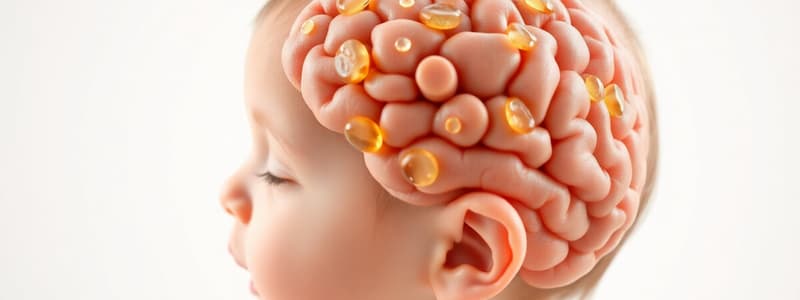Podcast
Questions and Answers
At what percentage of adult size is the human brain at age 2?
At what percentage of adult size is the human brain at age 2?
- 90%
- 50%
- 83% (correct)
- 75%
What percentage of an infant's total body weight does the brain constitute at birth?
What percentage of an infant's total body weight does the brain constitute at birth?
- 15%
- 10%
- 5%
- 12.5% (correct)
How much of the calories consumed by an infant does the brain use at newborn stage?
How much of the calories consumed by an infant does the brain use at newborn stage?
- 50%
- 80%
- 74% (correct)
- 61%
Which omega-3 fatty acid is NOT mentioned as important for infant brain development?
Which omega-3 fatty acid is NOT mentioned as important for infant brain development?
During which time frame does the brain weight increase by 61%?
During which time frame does the brain weight increase by 61%?
What percentage of calories does the brain use at 1 and 2 years old?
What percentage of calories does the brain use at 1 and 2 years old?
What percentage of a boy's brain weight is typically heavier than that of a girl during infancy?
What percentage of a boy's brain weight is typically heavier than that of a girl during infancy?
What role do fat stores play in human brain development at birth?
What role do fat stores play in human brain development at birth?
Flashcards
Brain Development in Infants
Brain Development in Infants
The initial stage of life within the first two years is critical for brain development. It's during this time that the brain rapidly grows and forms connections.
Caregiver's Role in Brain Development
Caregiver's Role in Brain Development
Infants are completely dependent on caregivers for their basic needs, including nutrition and stimulation, which are essential for healthy brain development.
Brain Size at Birth
Brain Size at Birth
At birth, the human brain is about 30% of its final adult size, representing a significant portion of the newborn's body weight.
Rapid Brain Growth During Infancy
Rapid Brain Growth During Infancy
Signup and view all the flashcards
Energy Needs of the Developing Brain
Energy Needs of the Developing Brain
Signup and view all the flashcards
Importance of Omega-3 Fatty Acids
Importance of Omega-3 Fatty Acids
Signup and view all the flashcards
Nutritional Needs of Infants
Nutritional Needs of Infants
Signup and view all the flashcards
Human Milk and Brain Development
Human Milk and Brain Development
Signup and view all the flashcards
Study Notes
Infant Brain Development
- Infant brains are 30% of adult size at birth, and 12.5% of newborn body weight.
- By age 30, the brain accounts for just over 2% of body weight.
- Boys' brains are typically 7% heavier than girls' during infancy, exceeding the difference explained by body size. This persists throughout life.
- Rapid brain growth occurs between birth and age 2.
- Brain weight increases by 61% between birth and 6 months.
- The brain doubles in weight by one year old
- Increases by 33% in the second year of life.
- At age 2, the brain reaches 83% of its adult size. This highlights importance of 2-6 years as well.
Infant Brain Energy Needs
- The developing infant brain uses 74% of the infant's caloric intake at birth.
- At 1 and 2 years, the brain still uses 53% of calories consumed.
- Infants have specific nutritional needs compared to adults, due to this high brain energy use.
Omega-3 Fatty Acids
- Omega-3 fatty acids (ALA, EPA, and DHA) are crucial for brain development.
- Full-term infants have 6 months worth of stored omega-3 fats.
- These fats are used to build brain structure and are found in high concentrations in breast milk, aiding brain evolution.
- Brain tissue is 60% fat.
Studying That Suits You
Use AI to generate personalized quizzes and flashcards to suit your learning preferences.




